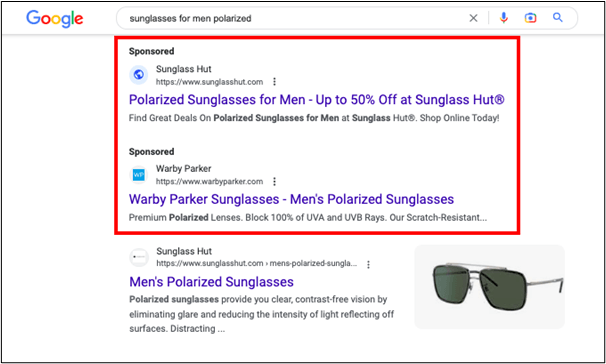Ecommerce PPC: Shop Owners Guide to PPC in 2024
Editor’s Note: This post was originally published in March 2023 and was updated in February 2024 for accuracy and comprehensiveness.
Looking for a quick, reliable, and measurable way to attract new customers to your online store?
Say hello to ecommerce PPC (pay-per-click) advertising — the perfect supplement to your SEO program.
In this post, we’ll explain the fundamentals of conducting effective PPC campaigns for ecommerce and discuss the advantages of teaming up with an ecommerce PPC management company.
But first, some basics.
What is Ecommerce PPC?
PPC is a form of advertising where you pay a fee whenever someone clicks on one of your digital ads. Some common examples of PPC ads include paid search listings, Facebook ads, and Google Shopping ads. This post will primarily focus on paid search ads, which appear as sponsored search results above organic listings.

Ecommerce PPC is when online stores promote their products using PPC ads. By serving audiences with ads based on the websites they visit and the keywords they search for, the PPC model gives ecommerce businesses an extremely reliable way to reach new customers.
Scale Your Ecommerce Business with Powerful PPC Strategies from HigherVisibility. We’ve been helping businesses grow since 2009. Let us help you!

Why Should Ecommerce Sites Use PPC Advertising?
PPC is incredibly popular among ecommerce brands, with 74% of companies saying PPC is a huge driver for their business.
Here are some reasons why PPC could be the ideal marketing channel for your online store:
You Only Pay When Someone Clicks
The most obvious advantage of using PPC to market your ecommerce store is that you only pay for your ad when someone clicks it. This means you don’t waste your marketing dollars paying for ineffective ads. You can also set maximum limits on your ad spend to ensure you never exceed your PPC budget.
Instant Results
Another standout benefit of PPC is that your ads go live as soon as you activate your campaigns. And if your ads are effective, you can drive significant traffic to your store quickly. This differs from organic channels like SEO, which can take several months to yield noticeable results.
Granular Targeting
PPC ads make it easy to reach specific segments of your target audience and attract highly motivated shoppers to your store. You can specify who sees your ads based on location, attributes, interests, search behavior, and a host of other targeting options.
For example, if you’re operating an online gardening tool store, creating a paid search exclusively targeting suburban residents over 50 years old interested in the outdoors would be possible. It’ll also be an efficient PPC strategy.
Measurability
All the major PPC platforms provide in-depth analytics to help you evaluate your campaign performance. You can easily tell which ads do well and which don’t and use this data to refine your strategy and improve your ROI.
What are Ecommerce PPC Best Practices?
Now we’re clear on the benefits of PPC for ecommerce, let’s look at some of the best practices for planning and implementing a PPC ad campaign.
1. Define Your Campaign Goals
Before setting up an ad campaign, you first need to clarify exactly what you want to achieve with it. This makes it easier to target your efforts to improve the bottom line.
Typically, the main goal of an e-commerce business is to increase sales or leads. But which segments of your target audience do you most want to reach? And which products are you most eager to promote?
You can choose to promote your best-performing product(s), the one receiving the most attention and driving the highest sales. This streamlines your advertising efforts, maximizes your ad spend, boosts reach, and drives sales.
In addition, you need to consider your budget while setting your goals. PPC is results-based, and you only get what you pay for. Once your ad spend is maxed out, your campaign pauses, even though you’re a step closer to hitting the mark.
So always ensure your budget tallies with your preset goals while guaranteeing profit. For example, if you sell a pair of sunglasses for $100 that costs your business $80 (including overheads), you’ll need to keep your CPC (cost-per-click) below $20 to make a profit.
2. Set measurable KPIs
After setting your goals, you need to identify key metrics to track performance and gauge the success of your campaign.
KPIs or key performance indicators are quantifiable metrics used to measure the success of your PPC campaigns in relation to your campaign goals. They provide actionable insights into how well your campaigns are performing – including areas of strengths and weaknesses.
For example, suppose your campaign goal is to increase sales (which is for most business owners). In that case, relevant KPIs to track are conversion rates, marketing-qualified or sales-qualified leads, return on ad spend (ROAS), and return on investment (ROI).
These help you focus on what matters to track your success and strategize how to scale what you already have.
3. Select the Right Keywords
The next step is to decide which keywords will trigger your ad.
Sticking with the sunglasses example, you might choose keywords such as ‘men’s UV400 sunglasses,’ ‘polarized sunglasses for men,’ and ‘men’s designer sunglasses.’ Your ad would then appear when your specified audience searches these phrases (and close variations of them).
Picking the right keywords isn’t as simple as brainstorming terms you think are relevant to your product or store. You need to select keywords people are actually using in their search queries and consider factors such as keyword volume, competitiveness, and intent. Tools like Google Keyword Planner can help you discover the best keywords to target.
As a rule, high-volume keywords will be more competitive and, therefore, more expensive. For this reason, it’s often a good idea to select less popular, long-tail keywords with high purchase intent to keep your CPC low and your CTR (click-through rate) high.
You can also specify negative keywords to ensure that your ads don’t appear when someone searches for something you don’t sell. For example, if your store only sells men’s sunglasses, you could add ‘sunglasses for women’ to your negative keywords.
Read more: How to target high-intent buyer keywords.
4. Create Your Ads
Next, you need to develop your ads.
To be candid, creating an ad that’ll convert isn’t simple. But success leaves footprints. You can replicate the same results by studying best practices from successful ads in your industry. Or similar. Here are some of the top strategies we use for our clients:
- Make your headline compelling and optimized for your target keywords. Leverage power words like ‘exclusive,’ ‘50% off,’ ‘free,’ ‘coupon codes,’ etc., to incite reactions from your target audience and increase CTR.
- Think of the user. What’s their primary goal? Weave this into your ad copy. Most times, this means highlighting your product’s benefits and not features. See this example below:
- Another effective strategy is incorporating your company’s unique selling point in the ad copy. This can be a 24/7 responsive customer service, return policies, or even customer reviews.
- If you’re using display search ads, ensure you use only high-resolution visuals that display your products in the best way – and angles too. Use schema markup to provide structured data about your products, enabling them to rank for rich results.
- Lastly, use clear calls to action (CTAs). Use action words like ‘buy now,’ ‘shop now,’ etc., to compel users to click through and make a purchase. The best CTAs are conspicuous and instantly convey the desired action to the visitors.
Tip: You need to specify which page the ad will point to, like your homepage, a category page, or a specific product page. Whichever page you choose, ensure that it has:
- Up-to-date product listings
- Clear and informative descriptions of the product
- High-quality images of your product
- A frictionless path to purchase. For example, the “buy now” link should be clickable and obvious. See this example from Butrish US:
Pro tip: Ensure your landing page is well-optimized for users and search engines. Examine your page for technical issues that may impact your ad performance. Also, remember that your campaign’s success depends on the quality and accuracy of your product feed data, so thoroughly review your ads before moving to the next step.
Read more on how to optimize your product pages for SEO.
5. Place Your Bids
With your ads ready to go, you’ll need to specify how much you will pay to display them.
Google Ads uses an auction system to determine which advertisers get to display ads for a particular keyword and in which position. The ad rank is a critical component of Google’s auction system, and it is calculated based on several factors: the bid size, the ad quality, and the context of the user’s search. As you’ll expect, the ad with the highest ad rank score will rank on top of the search results.
Quality score is another vital determinant of your ad’s position on the results pages. The quality score measures how helpful your ad is to the user and depends on keyword relevance, the quality of your landing page, and your expected click-through rate. It also influences your CPC.
Tip: To maximize your ad spend and position for success on the SERPs, ensure your ad elements satisfy user intent. Use high intent, long tail keywords that are exactly or closely matched to the user search queries. Technically, your landing page should be relevant to the ad, optimized for speed, and, most importantly, mobile-friendly.
Read more: How to improve ad performance using quality score.
6. Track Your Performance
Once your campaign is up and running, track your e-commerce performance using tools like Google Analytics.
Why is this important?
Data is the lifeblood of your ad campaigns. The more informed your ad strategy is, the higher your chances of getting high returns on ad spend (ROAS).
If you want more advanced reporting, use paid third-party tools like Ahrefs, SEMRush, or Moz. These tools have unique features, advantages, and limitations, so you need to consider them before choosing the right one for your business.
A good start will be linking your Google ads with Google Analytics (GA4). Add UTM parameters to your ad to help identify traffic sources or Google Tag Manager (GTM) to track conversions. This way, you can easily identify what is working, what’s not, and what you need to do.
Simply navigate to your GA account and click on Tools and Settings. Next, navigate to measurements >> conversion tracking. You’ll see this on your screen:
Click the ‘New Conversion Action’ button. Lastly, follow the prompts to set up your conversion tracking.
Once you’ve configured your account to track your goals and traffic, you’ll be able to gauge the effectiveness of your campaigns, double down on high-performing keywords, and adjust weaker ads where necessary.
Scale Your Ecommerce Business with Powerful PPC Strategies from HigherVisibility. We’ve been helping businesses grow since 2009. Let us help you!

Advanced PPC Strategies for Your E-commerce Store
Now that we’ve covered the basic steps of e-commerce PPC, let’s briefly touch on some advanced strategies that can take your campaigns to the next level.
Start your ad campaigns with an audit
The quality of your ads is primarily influenced by the quality of data you have at your disposal. Running an audit before kickstarting your campaigns helps you get the data you need for running a successful PPC ad.
If you’ve previously run PPC campaigns, target critical metrics like:
- Ad content/copy,
- Competitor unique selling point,
- Keywords and targeting strategy
- Ad groups and messaging,
- Ad formats and campaign types,
- Ad quality score.
- Areas of wasted ad spend, etc.
This is the same strategy we used for Allure Bridals, an award-winning bridal manufacturer with over 100 retail stores worldwide. Although they were already running successful SEO campaigns, they wanted to expand their reach and outshine the competition with PPC ads.
We started by thoroughly analyzing their previous campaigns to extract actionable insights into what’s working and what’s not. This includes the campaign structure, keywords, ad copies, landing pages, and bid strategies. This informed our comprehensive strategy for optimizing their campaigns in alignment with their predefined goals.
This approach accelerated their success. At the end of the campaign, they saw an increase of:
- 17.19% in sessions from paid search
- 45% of page views
- 25.36% in click-through rate
- 6.26% in conversions
What if this is your first time running a PPC ad?
Start by examining your current SEO performance to find what’s already working. Look at metrics such as overall traffic volume and user behavior for your target keywords to find top-performing areas to leverage in your PPC campaigns.
Run Competitor audits
Looking at your competitors’ ad campaigns can yield invaluable winning strategies. Start by listing the best-performing competing ads and benchmarking them against yours.
A more precise approach is using SEO tools. While Google ads offer valuable insights, using paid advanced tools like Ahrefs or SEMRush provides a wealth of information about your competitor’s strategies. SpyFU is an even more excellent tool. It lets you see every ad they’re running and their target keywords.
While using these tools, perform an analysis of their entire marketing stack. For instance, Ahrefs has an ‘Ads history’ feature that allows you to see the competing pages of any keyword. Here, you’ll see competing landing pages, the ad copies and format, the performance on the SERPs, etc.
Next, analyze their landing page and overall website. Is it mobile-friendly? How does the site speed compare to yours? How is their CTA structured? Are they targeting sales immediately or funneling traffic to a sales page? These low-hanging fruits help you gain a competitive edge on the search results.
Perform A/B tests
Now that you have gathered enough information from your site audit and competitors, it’s time to see which is most effective for your ad campaigns.
A/B testing is simply developing two variants of your ad elements, such as CTAs, copies, images, or headlines, to see which version is more effective in driving bottom-line results.
It’s highly effective as it helps you shift your focus and ad spend on revenue-generating campaigns, effectively reducing your cost per conversion.
Website Optimization
We have already mentioned the importance of directing users who click on your ads to a well-designed, easy-to-use landing page.
But the same concept applies to your online store more broadly. Your entire ecommerce website needs to be as user-friendly as possible to maximize your conversions. Your navigation should be intuitive, the checkout process should be seamless, and all your pages should load instantly and dynamically adjust to desktop and mobile devices.
Customer Retargeting
Chances are, a large percentage of users who visit your online store don’t convert. Maybe they’re window-shopping, maybe they need a little more time to research the product, or maybe they’re just waiting for their next paycheck to come through before they can buy.
Whatever the case, it would be useful to re-advertise your products to these visitors in the future when they’re more prepared to make a purchase. This is precisely what retargeting ads allow you to do. These ads use tracking codes to show your search and display ads to people who have visited your site in the past.
Responsive Search Ads
Google introduced responsive search ads in 2019. When creating these ads, you can add up to 15 headlines and four descriptions. Google then dynamically generates different ad variations based on the search user’s query, device, and drowsing behavior.
Over time, Google automatically selects the ad variations that work best. This results in optimized campaign messaging without the need for manual A/B testing on your part.
Think outside Google
While Google dominates the search engine share, don’t overlook other alternatives – Bing and Yahoo – to reach your target audience. They are less competitive, have lower costs per click, and allow you to tap into new market segments.
Another advantage of diversifying your ad spending across several search channels is that it mitigates the effects of overreliance on a single platform, for instance, unexpected algorithm updates.
For example, if you’re targeting millennials, running Microsoft ads can help you reach a potential target audience using Bing as their primary search engine.
Bing is the second largest search engine after Google, attracting over 1 billion searches/month. Most users on this platform are between 24 and 23 years old (30.17%), making it an excellent option for reaching your target demographic.
This combined approach can increase your website traffic, your brand visibility, and, most importantly, sales.
Read more: How much does PPC cost?
Why You Should Consider Hiring an Ecommerce PPC Management Company
We have just spent the last few minutes of your time describing how PPC is a great marketing channel for ecommerce businesses. And while this is undoubtedly true, the fact is that successfully managing PPC campaigns can be challenging.
Some of the main difficulties of running PPC campaigns include getting to grips with key concepts and terminology, understanding which ad types and platforms best suit your needs, and dedicating enough time and resources to manage and adjust your ads effectively.
This is why so many ecommerce businesses turn to professional PPC management companies for support. These companies specialize in developing high-return PPC campaigns for ecommerce clients, drawing on expert knowledge of which metrics to track and which strategies to deploy for optimal results.
Scale Your Ecommerce Business with Powerful PPC Strategies from HigherVisibility. We’ve been helping businesses grow since 2009. Let us help you!

